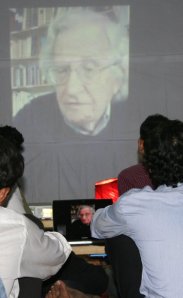In US-Pakistan relations stability means obedience: Chomsky
“Stability to the US means obedience. As long as Pakistan is obedient it will be considered a stable ally,” said MIT professor emeritus Noam Chomsky on Wednesday.
Chomsky said the moment Pakistan stopped cowing down to the US, the talks of nuclear threat and jihadi movements would start making headlines in the US media. He said while the threats existed, but they would merit action only when they threatened US interests.
“We’ve all heard the term ‘to stabilise the region’ from the US government. Whenever the term is used it actually means that the US will destabilise the region but ‘stabilise’ any threat to its interests,” he said.
He was speaking at the Café Bol in Gulberg’s Main Market on Wednesday. The lecture marked the season opening of the annual lecture series at the cafe. The first lecture included a tribute to Eqbal Ahmad, one of the most proactive political thinkers of the past few decades. Chomsky, a friend of Ahmad, himself enjoys what can only be described as cult status in a discipline that seldom endorses such interest among young and old alike.
Chomsky spoke to a packed audience of over 80 people in an empty room above Café Bol via skype from his academic offices at MIT in the US. He spoke on several subjects during the one-and-a-half hour lecture. These included a brief history of the World War II, US imperialism and involvement in Latin America over the past three decades and the consequences as well as a more recent take on Pakistan.
He also spoke fondly of his late friend Ahmed and the man’s involvement in improving Indo-Pak relations, his work with the National Liberation Front in Algeria and Ahmed’s politics. “He was an incredibly astute analyst. Discussion on every subject he touched upon was improved because of his involvement. He best predicted the future of both American and Pakistani political policy in the coming years,” Chomsky said.
One of the most interesting subjects Chomsky elaborated upon was the situation in the Middle East and the parallels that one could, and could not, draw from it for Pakistan. “The US and its imperial allies will always prevent a functional democracy in the Middle East because that places the region beyond its control. They like democracy on paper but the fear of ‘real’ democracy in other parts of the world is cemented in the US psyche. It would mean a severe lapse of control where they are involved,” he said.
With regard to Pakistan, Chomsky elaborated on his late friend’s view that the country’s leaders severely lacked commitment to the land and to its people. “Eqbal always said that there can be no revolution or change without a genuine commitment to the cause and that is lacking in Pakistan. Many don’t care if the country goes down the drain as long as they can profit from the fall out,” he added.
During the question and answer session that followed, the MIT professor was asked to address the recent allegations against him and others such as Tariq Ali for being ‘Taliban Sympathisers’. “I don’t like to answer such questions because it tends to give them weight,” he said. “It’s like saying I’m in favour of child abuse. It’s so insipid and without basis that it doesn’t merit a response,” he said.
With regards to the US-Pak relations post Osama bin Laden, he opened with a ‘Freudian slip’. “US-Pak relations post Obama or Osama? The fact is that not much will change from the present or at least it wont change quickly. Whether or not the US likes it, Pakistan is all it has got to keep control in the region. The country may not be it’s favourite ally but it is certainly one of the most important ones, if not the most. Aid will continue and support will continue. There is simply no other alternative.”
Prof Chomsky also addressed the Israel-Palestine situation during the lecture. “The US knows that it is losing friends and fast. Over a 100 countries now recognise Palestine in some variety or the other and that exceeds more than half the world’s population. We know we are all moving towards a two-state solution and even this US government is beginning to recognise that,” he said.
Published in The Express Tribune, May 26th, 2011.





















